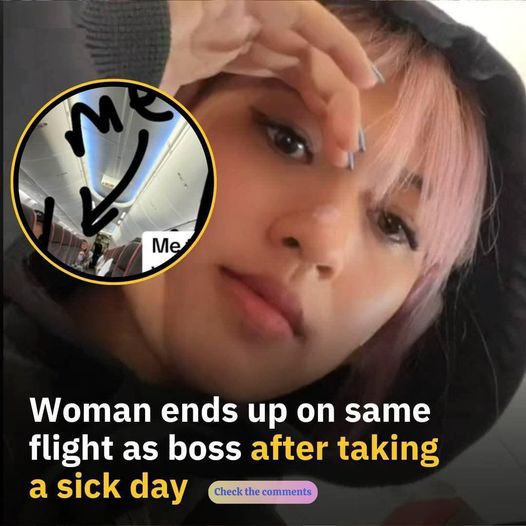It’s the classic scenario: a sudden “sick day” to escape to paradise, only to have the plan backfire spectacularly. A woman recently shared her misadventure online after lying to her boss about a doctor’s appointment to take a secret holiday trip to Bali. What she didn’t expect was to bump into her boss on the very same flight—transforming her planned getaway into a hilarious yet humbling lesson about workplace honesty.
As the story unfolds, this woman carefully planned her getaway to avoid suspicion. She informed her boss she was unwell and unable to work, securing the day off under the guise of a medical appointment. Confident in her plan, she boarded her flight and settled into her seat. Everything seemed to be going according to plan, until she looked around the cabin and spotted her boss just a few rows away. It’s one of those nightmare scenarios that could make anyone want to disappear into thin air, but for this employee, it was a startling reality.
The experience quickly turned into an unforgettable lesson. The woman, not wanting to let the story fade into anonymity, decided to share it on TikTok. In her post, she recounted the surprise of realizing her boss was on the same flight and the uncomfortable moments that followed. Her TikTok video quickly gained traction as viewers shared their own similar experiences or weighed in on her situation. Some found humor in her predicament, while others empathized, recognizing the pitfalls of seemingly innocent white lies in the workplace.
One commenter wrote, “I once called in sick and ran into my boss at a restaurant. Safe to say I was unemployed shortly after!” Another shared, “I feel your pain. I once tried to pull something similar, and it didn’t end well for me either.” Stories like these underscore the fine line employees often walk between personal freedom and professional obligations.
The viral reaction speaks to the broader theme of honesty in the workplace. In many cultures, taking “sick days” or “mental health days” has become a norm, especially as awareness of mental wellness grows. However, the pressure to justify taking time off can sometimes push employees into creating white lies. But, as this incident illustrates, not all white lies remain hidden.
While some may see this as a minor infraction, others argue it’s a trust issue that could affect her reputation within the company. Workplace experts often emphasize the importance of transparency, particularly as workplaces evolve toward supporting employee well-being. Many companies now offer flexible schedules, remote work, and mental health days, recognizing that employees sometimes need time away from work for their personal lives. However, this flexibility comes with a degree of accountability. When employees resort to deception, it can undermine the trust they’ve built with employers, and the consequences may be more serious than anticipated.
This story also reveals how social media has reshaped the way we share and react to personal stories. By posting her experience online, the woman invited a global audience into a private moment, turning her blunder into a public lesson. As reactions poured in, her story sparked a larger discussion about the workplace norms around honesty, with people chiming in with both laughter and cautionary advice.
In the end, while no one is immune to occasional fibs or the temptation to take a spontaneous break, this story serves as a reminder: sometimes, honesty really is the best policy. This woman’s experience highlights the potential consequences of workplace deception, especially in a world where transparency and trust are increasingly valued. For employees considering a similar “sick day,” it may be wiser to take a straightforward approach with managers or HR. Many companies are open to discussing flexible time off, especially when approached with honesty.
For those reading this tale and reflecting on their own work-life balance, perhaps the takeaway isn’t just about honesty but also the importance of open communication. Many employers are more understanding than employees might think, willing to provide the flexibility needed for rest and relaxation. And, as the woman’s viral experience has shown, while the thrill of a covert escape may seem enticing, the aftermath might not be worth the risk.
In the end, the woman’s story didn’t just serve as a funny anecdote but a gentle caution to anyone considering bending the truth. Workplaces are evolving, and as they do, the best approach may simply be to foster a work culture where employees feel comfortable requesting the time they need without needing to resort to white lies. As this woman’s holiday mishap has reminded us all, it’s better to be open about needing a break than to risk a chance encounter that might lead to embarrassment—or worse.

